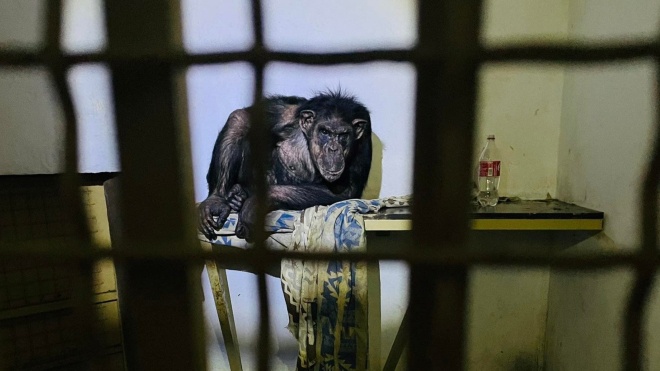We saw everything [on February 24] in the first minutes, as those [helicopters] flying to Hostomel flew just over us. The bridges had not been blown up yet, and we spent the day at the zoo. The next day I left home to spend the night there, and in the morning [February 26], it was already impossible to come because the Irpin bridge was blown up. From that moment, the blockade of the zoo had started, and it ended only on March 31. Now there are military. They are clearing everything, so the civilians are not allowed to go there.
Seven people have been in the zoo all this time. They are our employees who had been living there permanently. They had some supplies, and we also managed to deliver something. It was a minimum, not a healthy diet, but anyhow they had food. Damn, I do not know how they managed to survive, but thanks to God, they did.
The animals had been in good condition before the war, so they could also survive. But the main thing, of course, was they had people around who took care of them. Two days ago, we were able to bring the first truck with normal food, so we hope that the animals will regain their strength.
Of course, we do not store animal food because we always assume constant supplies. We tried to keep in touch with the zoo, although there was almost no connection. We brought diesel engines, generators, so they could live through it [until the occupiers left].
In the first days, several animals died, but not from the cold or hunger. They died because there was constant bombing, and they were scared. Some of them were very weak and died of fear, some crashed into the cage when it was shelling, and they started to run into cage sides.
We have already taken our monkeys because [in the zoo] there is neither gas nor electricity. There was only a gas boiler in the monkey house, so it was cold there, and the monkeys were the first ones to die. It will take a long time to connect the zoo to utilities, and they are living in the harshest conditions. I canʼt even describe how scary was the picture I saw. All that time, they were sitting in “a drawer” one and a half by two meters, four monkeys in one drawer, because it was needed to move them to the place where it could be somehow warmed up. They were barely cleaned up after and somehow fed.
We had two orangutans who grew up in my house. My wife took care of them all the time, and they actually grew up as our children. They are very smart and understand everything. At the very beginning, we pulled these monkeys out of the zoo, put them in boxes, and transported across the river in boats. Fortunately, the Russians did not object much then.
[Giraffe] Mykola Stepanovych, our largest animal and the head of the family, fell during the bombings. Usually, if a giraffe falls, it does not get up but dies. But somehow, he got up magically, and now heʼs walking. He has some health problems, was receiving medicine, but we couldnʼt do this [during the occupation]. Now that we have sent the medicine, I hope it has arrived, and there will be some improvements for him.
The occupiers came several times. They said they needed to check what was happening at the zoo. They inspected everything and were surprised. Probably, they have never seen such well-kept zoos. They did not touch the animals but blew up our office building completely.
If Russian troops had not been left the place thanks to the pressure from Ukrainian Army, I think mass deaths [of animals] would have begun next week. We hope that they will open the road soon and our employees will start to return there. Everything will be fine if the Russians wonʼt do something mean, if they wonʼt come back or shell us with something.
Translated from Ukrainian by Olya Panchenko .
"Babel" needs support from its readers now more than ever. If the work we do is important to you, please, send us a donation !
